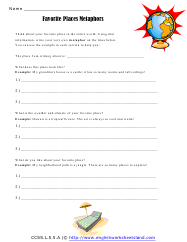Metaphor Worksheets To Print:
In th Poems!- What does the poem mean to you? We have you breakdown a poem to look for deeper meaning.
Songs - We breakdown a song with you. See if you can spot how this technique is used in music.
Favorite Places - It looks like a place to play. What is your favorite place? Write all about it.
Family Members- Do you appear to look closely related to a family member? Tell us all about that person.
Compare Feelings- All types of emotions are stirred up here. Explore how language can be used to express hidden meanings.
Search It- Read the following diary entry and underline all of the metaphors you find!
Search It 2
- By now, you already know that a metaphor is a tool that writers can use to create a better image in the readers' minds of an idea they would like to share.
Metaphor vs. Simile - Read the sentences below. Underline the sentence if it is a simile. Circle the sentence if it is a metaphor.
Rewrite- The first one has been done for you.
Rewrite Again - Rewrite each sentence to make it into a metaphor. The first one has been done for you.
Uncover It - Every metaphor has a meaning behind it. Read the following selection of text and see if you can unlock what the sentence is trying to say!
Unlock the Meaning - Circle the two objects that are being compared. Then, write down how those two objects are alike.
What's in a Metaphor? - The following sentences are all examples of this form of literary device. Tell us what the two objects have in
common.
Make Your Own Weather - Write your own song verse with a metaphor involving the weather. Use the verse from "Naturally" as an example to write your own. Make sure it is about how people can be like the weather.
More Related Worksheet Topics:
Cliches - These are often overused. Not much thought goes into it.
Why Do We Use Metaphors?
When we are trying to draw a sharp comparison between two things and we really want to get our point across, in a fantastic way, we will often use metaphors. They are a form of figurative language that can really get a point across to readers. For example you could say the, "The car door opened." Sure, this will get your point across to your readers and they will understand what has happened, but you could really juice up the sentence and make the situation vivid to your readers by adding a metaphor. What if we changed that sentence to give the reader a sense of the speed that it opened, just by adding one simple word? "The car door flung open." This instantly gives the reader the sense that the car door had some velocity when it opened. The reader now has a sense that someone or something was behind the door opening. In the first version we had no idea if the door opening was simply caused by gravity.
Metaphors are often used at times when authors are trying to paint the nature of a character or the situation they are in. In literature they are often used to demonstrate the nature of a relationship. An author could say "Sally was not happy that Tim decided to leave her." This would provide the reader with the facts, but it doesn’t really paint a picture. We can easily jazz up that sentence with something like, "Sally was completely heartbroken that Tim left her side." Does Sally's heart literally broken? No, but it adds a new level of emotional connection between the characters.
How to Identify a Metaphor
Authors use metaphors to add vivid descriptions and examples for their readers. This helps their readers get a solid mental picture of what they author is trying to portray in their work. Metaphors can be spotted by first identifying that a comparison or likeness is being stated by an author. Not all comparisons are metaphors. If the words "as" or "like" are present, this usually indicates the comparison is be put forward as a simile. They also push the thought that one thing is or was previously something else. You need to remember that metaphors are presented in a fantastic form to massage the reader’s thoughts.
There are several different types of metaphors:
Absolute- When you compare two things that have no real connection.
Dead Forms- These are used way too often. Like songs that are overplayed on the radio. They in-turn lose their affect on the audience.
Implied - This is a comparison made with specifically stating the comparison.
Root Forms - These are the opposite of dead metaphors. We use these every day, but no one ever seems to get bored of them. They become part of our culture.

